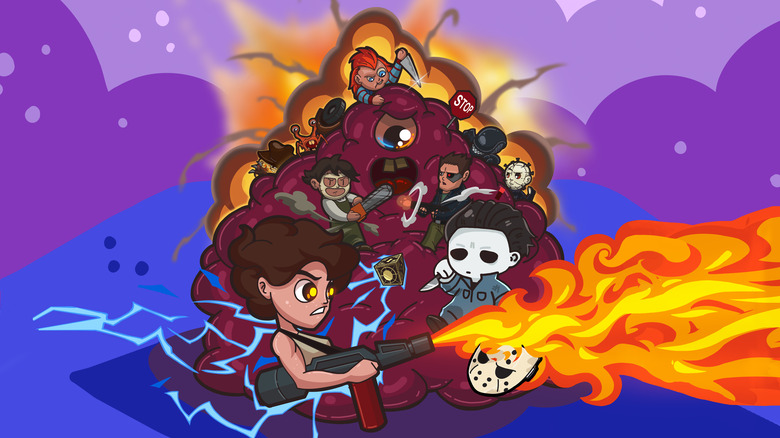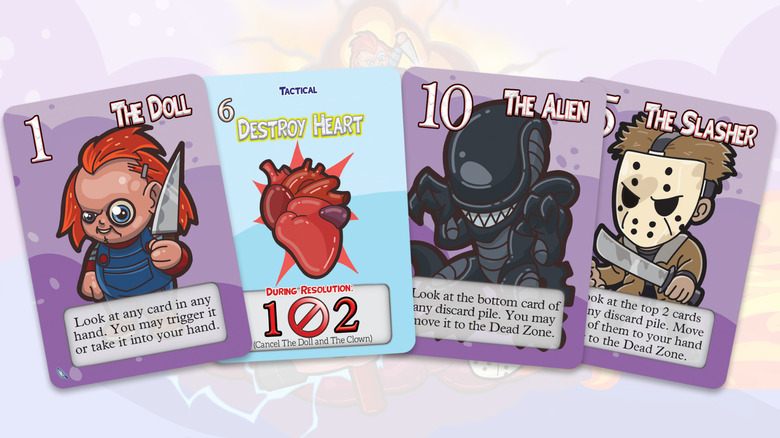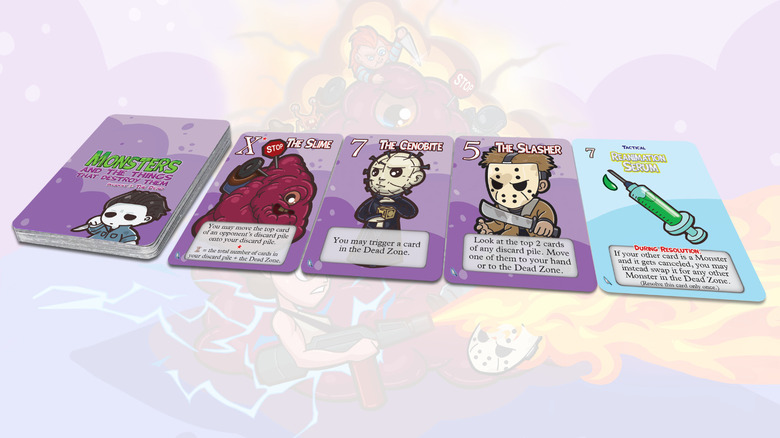Monsters: The Dead Is The Adorable Horror Card Game Where You Bluff Your Way Through '80s Horror Icons
Over the past few years, independent board game publisher Vigour Games has carved out a niche in the social deduction space. With games like "GROWL" and "Chaosmos," Vigour focuses on games where judging your opponents and remembering their actions is the key to victory. This Halloween marks the addition of a new bluffing game to the Vigour Games family: "Incident: 3: The Dead," the third set in the "Monsters and the Things that Destroy Them" series.
Created by Joey Vigour — whose "GROWL" mechanics will soon be featured in Asmodee's "Stranger Things: Attack of the Mind Flayer" — "Monsters and the Things that Destroy Them" was successfully funded on Kickstarter earlier this year. "Monsters: The Dead," which hits Kickstarter today, builds on the success of that project by creating a new self-contained collection of cards under a new theme: beloved '80s slashers like "Hellraiser," "Aliens," and "Nightmare on Elm Street."
Memories of monsters
As a series, "Monsters" touts its simplicity as a game that takes "under a minute" to learn. For once, a board game publisher may not be underselling The Teach. Each player starts with a one-card hand and draws from a shared pool. As the game progresses, players will draw up to their hand limit — three cards — and slowly build their discard pile. When a monster is drawn ("awakened") from the card pool, it uses its ability, often allowing you to trigger, discard, or swap cards between hands or discard piles. For "Monsters: The Dead," Vigour Games has added a new mechanic: The Dead Zone, a face-up spread between players that can further vary what cards you draw or discard.
When the draw deck is depleted, the game moves into the final Resolution phase where each player selects two cards from their hand. The highest point total wins, but there is a catch: monsters can be modified or even nullified by tactics, so players much choose between aggressive point totals and defensive tactical moves. Players must remember what cards have been taken and where they might have ended up if they want to collect the most points. For example, you may choose to keep The Alien for a whopping 10 points, but if your opponent players the Flamethrower tactic, your Alien card is cancelled — and your opponent still gets the two points printed on the tactic. 10-2 quickly becomes 2-0.
At its core, "Monsters: The Dead" offers players a unique combination of memory and set collection mechanics. Each monster in the game's 21-card deck can be nullified by a corresponding tactic, but the points values of the tactics are significantly lower. This push-pull triggers an ongoing series of moves and countermoves between players. Do you grab the Slasher card to maximize your point total? Or was the Liquid Nitrogen tactic the one that your opponent took when he swapped the top cards of the discard pile? It might not be a bad idea to pocket tactics for the Resolution round, but if you remember-slash-guess wrong, your opponent can scoop up a ton of points uncontested.
This emphasis on memory makes "Monsters: The Dead" an audience-dependent title. Just as I have friends who tend to avoid asymmetrical board games, I often struggle with games designed around memory or pattern recognition. Losing a game because I forgot to track an important piece of information offers an unsatisfying endgame experience, which is why even beloved social games — like "The Resistance" or "Codenames" — are very rarely featured at my board game nights. Had "Monsters: The Dead" offered the same mechanics without the (admittedly delightful) horror theme, I'm not sure I would have given it a chance.
(My wife, who also described her in-game strategy as more "vibes" than tactics, still managed to win a best-of-three matchup. I loved the cards I ended up with each game, though, which was my secret win condition all along.)
Kid-friendly slasher icons
But these are more my personal preferences than any failings of the design. I know many gamers who would live for this push-pull of tactics and tension — and even my terrible short-term memory occasionally triumphed with a clever counter at just the right time. But even if "Monsters: The Dead" is not the game you would usually put on your table, the theme and cute art design should inspire more than a few players to add it to their collection. It turns out that '80s horror icons fit neatly into the "Monsters: The Dead" aesthetic, with characters such as The Cenobite (Pinhead) and The Shape (Michael Myers) looking more family-friendly than ever.
Since most tactics cards negate two monsters, the designers also demonstrate a clever exploration of horror tropes in pairing those effects. An obvious example: the Flamethrower tactic can cancel both The Thing and The Alien, a nice bit of intentionality from a game that can seem silly on the first pass. My favorite is Reality Check, a tactic that cancels both The Cenobite and The Dreamstalker; seeing monsters linked by their weaknesses makes the theme feel more cohesive than arbitrary. The good news for "Monsters: The Dead" is that if this expansion fails as a Kickstarter campaign, the creative team could quickly recoup their losses through pins and stickers alone.
And while "Monsters: The Dead" may wink its way through '80s slashers, if you take to the mechanics and want to destroy (all) more monsters, its predecessors also draw on different elements of horror history. "Monsters: The Dark" uses the Universal Monsters as its baseline, while "Monsters: The Deep" draws more heavily on aquatic monsters – including the works of Jules Verne and H.P. Lovecraft. There's enough variety in both theme and mechanics to make the broader "Monsters" universe worth your while if you like bluffing and cute little monsters.
I hope that "Monsters: The Dead" will find an enthusiastic audience on its new launch; the success of the initial campaign — and the penchant of horror fans to buy any merchandise connected to '80s slashers — suggests that this expansion will bring the game to its widest audience yet. And while I might not personally return to "Monsters: The Dead" soon, it's hard not to like a game that turns such simple mechanics into complicated decision-making. It's a rock-solid little memory and set collection game that will truly shine for the broad intersection of board game and horror fans.


